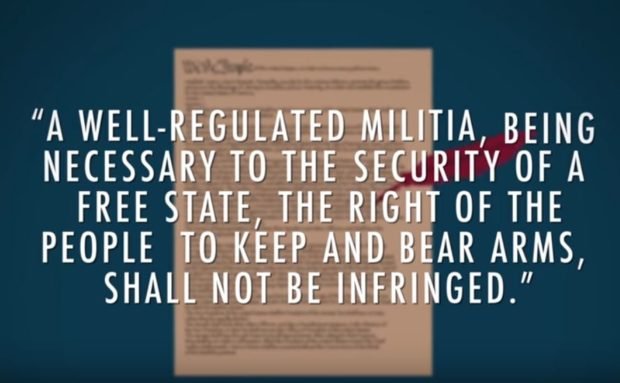National Right To Carry: An Individual Right, Not A State Right
The U.S. House of Representatives voted on National Right To Carry on November 16th.
An unusual argument against gun rights has been presented by the small-government crowd, of which I consider myself a member. Ed Morrissey at Hot Air best describes this issue:
For permit holders like myself, the ability to travel with my pistol into other states without having to worry about reciprocity issues would be helpful indeed. But that doesn’t address other fundamental issues involved, such as the ability of states to set their own rules for permit issuance and carrying. Some states, like Minnesota, require a certain amount of training to get a permit, while others do not. Should Minnesotans be forced by the federal government to have non-residents carrying in the state under less-restrictive conditions than their own citizens have to address? For that matter, should Minnesotans have the right to carry in Illinois while the state forbids its own residents to do so, even apart from the question of whether Illinois’ policy is intelligent? (Let’s just stipulate that it’s idiotic, but also that Illinois voters don’t seem to be in a rush to correct it, either.)
To put this argument in context, I ask the reader to consider the following (intentionally absurd) “news story”:
A debate is brewing in Congress over the National Right-To-Not-Be-Murdered (NRTNBM) Act. This act, if passed, will allow bearers of state-issued No-Murder permits to resist murder in other states.
But some small-government thinkers challenge the validity of a federal no-murder mandate.
“We must respect the right of states to determine who may lawfully resist murder” says Bob Walters of the State’s Rights Institute. “There are legitimate public safety concerns here. If State A issues a No-Murder permit to anyone, but State B only issues No-Murder permits to persons who can prove a need to not be murdered, should State B be forced by the Federal government to recognize State A’s lower standards? I respect the right of people to be murder-free, but states should be free to decide who may be murdered and who may not.”
Rob Parker of the National Anti-Murder Association disagrees. “Every American has the right to not be murdered, whether they happen to be standing in New York City or in Tulsa, Oklahoma.”
Legal analyst Bobby Jones gives us insights into the legal framework of the bill: “To date, the Federal courts haven’t ruled that the ‘Partial Faith & Credit’ clause of the Constitution extends to the right to not be murdered. However, the Eleventeenth Amendment explicity states that the right to not be murdered ‘shall be infringed in a manner prescribed by Congress’, so the courts will likely rule that this law, if passed, would meet Constitutional muster.”
48 of the 50 states have procedures for issuing no-murder permits. Vermont allows any person over age 16 to resist murder without a permit. Only Illinois requires that all residents submit to murder. If the NRTNBM Act passes, Illinois would not be required to recognize other states’ no-murder permits.
Murderer-rights advocate Robert Brady strongly disagrees with the intent of the bill: “In a civilized society, only police and military should be murder-free. We’re all safer when the government exercises a total monopoly on murder. Allowing just any common citizen to decide whether or not to be murdered will mean blood in the streets. Besides, studies say that a person with a no-murder permit is 347.9 times more likely to kill their own children than to resist murder, and I promise we didn’t fund that study.”
I use this farce to make a point: Each of us has an inalienable, natural right of self-defense. We have a right to go about our lives unmolested, and a right to use whatever means are necessary to assure that condition. We have a right to keep and bear arms for that purpose, which- despite the absolute phrase “shall not be infringed“- has been infringed upon to an intolerable degree by the federal government and by states and municipalities.
For those who mistakenly invoke “states’ rights” and resist a “federal mandate” recognizing individual rights, let’s take a trip back through history. At the end of the Civil War, southern states began writing laws to disarm newly-freed blacks (freed, incidentally, by a “federal mandate”). These states claimed a “states’ right” to deny gun rights to blacks. The federal government created another “federal mandate”- the Fourteenth Amendment- to combat this tyranny. As Justice Clarence Thomas explained in the McDonald decision (incorporating the Second Amendment on the states), the Fourteenth Amendment was created specifically with the First and Second Amendments in mind, and it is historical and legal irony that the Second Amendment was among the last of the Bill of Rights amendments to be “incorporated”.
Incidentally, I have twice criticized Herman Cain for holding to this absurd “states’ rights” view (here and here).
Why were these “federal mandates” legitimate? Because one of the legitimate powers of our government is to guarantee and protect the rights of the individual. The fact that our government frequently fails to exercise this power, does not mean that it should be prevented from exercising it. Without the power to “mandate” the recognition of both natural and Constitutional rights, our country would cease to be the republic our Founding Fathers created, and would become a majority-ruled democracy, where individual rights are subject to popular will.
Let’s also be clear about something else: Governments don’t have rights! In our form of government, people have rights. Governments have powers, which are limited in scope.
Stated differently, we already have a series of “federal mandates” on the subject:
The Second Amendment, which provides that the right to keep and bear arms “shall not be infringed”;
The Ninth Amendment, which extends protection to all rights (including the right to self-defense), not merely those rights enumerated in the Bill of Rights;
The Fourteenth Amendment, which imposes the Bill of Rights on the states;
The ‘peaceable journey’ provision of the Firearm Owners’ Protection Act, signed by President Reagan in 1986, which requires states to allow persons to transport firearms during travel;
The ‘Full Faith & Credit’ clause of the Constitution, which requires states to recognize the comparable acts of other states.
In sum: If we assume the Second Amendment’s “well-regulated militia” provision doesn’t reference Congressional authority (Article I, Section 8) to train and discipline (in other words, to “regulate”) the militia, but rather authorizes Congress to “regulate” individual behavior;
And if we assume the Ninth Amendment is an “inkblot” which doesn’t actually guarantee the exercise of unspecified natural rights;
And if we assume that government, rather than our Creator, grants us our rights;
And if we assume that the right to “life, liberty, and the pursuit of happiness” is limited by the violent acts of others;
And if we assume that the Fourteenth Amendment was only intended to guarantee “certain” rights;
And if we assume the word “Full” in “Full Faith & Credit” is actually a synonym for the word “Partial”;
And if we assume that states have “rights”, rather than “powers”, and among those “rights” is the right to decide who may exercise civil liberties and who may not;
And if we assume that our Founding Fathers didn’t intend us to have “a republic, if you can keep it”, but instead intended us to suffer the “tyranny of the majority” of a popular democracy, and intended for government to enforce popular whims rather than protect individual rights;
Then perhaps there is a valid argument against a “federal mandate” recognizing greater freedom of personal protection.
Or we can ‘mandate’ that people learn how to read before interpreting the Constitution.


